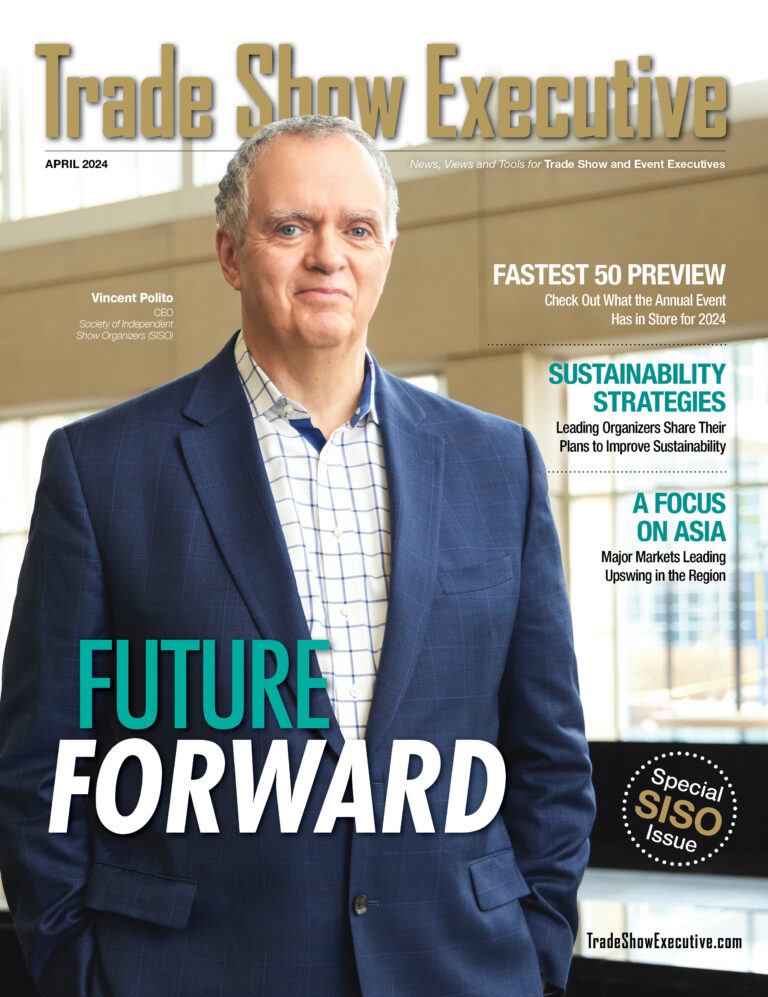Trade shows came to a screeching halt during the COVID-19 pandemic, and as many hit the restart button, health and safety are front and center. This adds yet another potential complication to already tricky contract issues.

“The situation is rapidly evolving as the vaccine rollout picks up steam and government restrictions are eased,” said Lisa Sommer Devlin, Founder of Devlin Law Firm of Wilmington, Del. At press time, the U.S. is vaccinating a staggering 4 million of its citizens on a daily basis. California has plans to open its golden doors on June 15, yet COVID variants are ravaging Canada, Europe and Brazil, putting a pebble in our shoes as we trundle the road “back to normal.”
Amidst this cacophony of chaos, supplier contracts have been put to the test. No matter how well-written or interpreted, old, new and revised clauses and provisions are now top-of-mind to protect groups from COVID-19-related cancellations and other contractual adjustments.
“This pandemic is not a one-and-done situation,” said David Amidon, Partner and Chair-Business Media Group at Burns & Levinson LLP, Boston. “You need to learn from this experience where your risks and exposures are. Now is the time to re-examine all your event agreements for suitability in the new paradigm, with the expectation that virtual will be an ongoing component of the event cycle.”
And while Devlin reminds us that contracts were terminated without issue for a year, all show producers are concerned about the future and with good reason. “Vaccine passports” are under serious debate in most western countries, and the issue of admitting attendees and exhibitors who choose not to be vaccinated still needs to be addressed by the industry.

Contracts for the near future should still have “COVID” clauses, whereby a party accepts responsibility for overseeing social distancing and mask mandates, explained Joshua L. Grimes, Esq., Grimes Law Offices, LLC, Philadelphia. “Enforcement of these things (for groups that want to enforce) is critical,” he added.
While Devlin reminds us that nobody can protect themselves from a lawsuit, Grimes urges show producers to consider having attendees sign waivers. “They are not a guaranteed solution, but they can help,” Grimes said, and added it’s important to allocate the responsibilities of enforcing COVID rules such as masking and social distancing in your contracts.”
Related. InfoComm Trade Show Hits Fast-Forward for Online Expo; Serves its Community
Force Majeure
Force majeure has historically been an “event” like a fire, flood or hurricane that impacts the venue and is obvious to all, said Devlin. But COVID 19 has been a “rolling” force majeure with no predictable ending, she added. “There were no real precedents under the law in dealing with such a situation, and the courts will take years to sort through all the legal implications.”
Also, force majeure provisions have been updated because of COVID to provide specific timeframes for show hosts to make a decision to cancel, Grimes said, adding that, “Exhibitor and sponsor contracts have also changed, since not all would want to do virtual or hybrid meetings.” Grimes urges show managers to put comprehensive force majeure clauses in their contracts, making sure they cover anything that might happen. “And read your contracts carefully; don’t take the other party’s word for what’s in there.”
Hybrid is Here to Stay
Amidon says it is important to have a clear understanding of how an event translates to a virtual format. For example, he says, the XYZ Flower Show for obvious reasons — won’t work in 2020 as a virtual event. “A contract right to pivot to virtual was absent or unclear in many cases,” Amidon said, adding the ability to pivot to virtual is a function of the organizer’s contract rights. Effective communication is one way to reduce risk, he added.

Organizers should make it a priority to educate their customers that virtual conferences are valid, legitimate and value-added first-rate experiences, Amidon said, and acknowledged this switch might be difficult for many to make. “Also, create a virtual platform that encourages participation by delivering a quality experience,” he advised. “Whether an event is in-person or virtual, it’s still all about serving the customer and creating positive interactions on every level. Find out what the concerns are and address them enthusiastically.”
“Perhaps the best approach is to work with all parties involved in the event (venue, show organizer, exhibitors, etc.) to agree on a “go/no go” deadline for the decision to switch to virtual or hybrid,” Devlin advised.
While the deadline will vary depending on all the factors involved in the event, you should be as close to the event date as possible, she added.
“The goal should be trying to get events going again, with the parties involved working together to be flexible to make that happen. Smaller/hybrid events are better than no events and every participant in the industry will have to adapt to shorter planning schedules for a while,” she said.
As to how to safeguard from exhibitors unhappy with the switch to virtual, Grimes said: “If your exhibitor contract has a `no refunds’ clause, you may not be obligated to offer a refund, although it might be good policy to offer a refund anyway. Otherwise, offer exhibitors and sponsors an alternative. If they don’t want to participate in virtual, offer to credit any amounts they already paid to next year’s meeting, and perhaps guarantee exhibiting next year at this year’s rates. Or, be creative. Litigation is time consuming and distracting, so it should be avoided.”
Sponsors
Meeting sponsors are also a concern, said Grimes, who cautioned show producers that the terms for virtual sponsorships may be quite different than for in-person meetings. A sponsor should agree when their name/logo will be mentioned at the virtual event, and for how long. “The show host should also have no liability for technical glitches that affect their exposure to participants,” he said.

Insurance
The issue of trade show insurance is far-reaching and broadly covers event cancellation and disruption insurance. However, many organizers learned that “show-stoppers” insurance didn’t cover cancellations due to COVID-19, David Amidon said. He urged show producers to acquire a clear understanding of their insurance limits.
Foster further advises show managers to specify both the type and amount of insurance both parties are required to have, and to have both parties (Group and Hotel) list each other as “additional insured” on each other’s policy, and agree to furnish a Certificate of Insurance to the other party.
Foster advises show producers to be wary of third-party claims, saying they are usually brought by attendees or guests at the meeting claiming that either the Hotel or the Group or both were negligent and caused them to be injured. Such claims by the Hotel or Group against the other for property damage should be limited to the amount of property insurance required in the contract. “Every Hotel contract with an Indemnification provision should require both parties to have Insurance that pays for third-party claims.”
There have been many situations that have impacted the meetings and events industry, from 9/11 to the economic crash of 2008 and others, said Devlin. “The industry has always bounced back, and I think it will this time, as well. We may all be more concerned about the risk of communicable diseases going forward, but people want to get together and do business, and I don’t think that will ever go away.”
Foster’s Tips
Veteran meetings industry attorney John S. Foster, of Atlanta, teaches many seminars on contract negotiation and shared a few points from his “Best Practices for Establishing Health and Safety Rules Contractually.”
- Give your attendees an ample heads-up of your health policy (emails, registration website, etc.) to which they must agree;
- If your policies may result in attendees being prohibited from attending the event or otherwise excluded from event activities, have a clear refund or registration transfer policy;
- Be very clear in describing what is allowed, what is prohibited and what is advised.
Reach John Foster at John.Foster@FJGLaw.net; Lisa Sommer Devlin at lisa@devlinfirm.com; Joshua L. Grimes at grimesj@grimeslaw.org; David Amidon at damidon@burnslev.com











